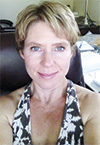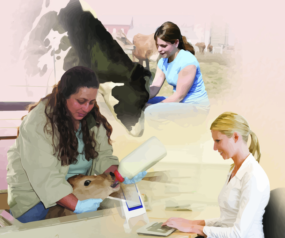Female leadership is lacking in Idaho’s dairy organizations. The number of women serving on the boards of Idaho’s dairy organizations is hauntingly close to Agatha Christie’s best-selling mystery novel And Then There Were None (sometimes known as Ten Little Indians).
Not none, but from 2013 to 2014 the board make-up of women went from two to one – not the progressive trend women would like to see. While investigating this perplexing mystery, a number of factors became suspect. The cultural tradition of gender division within dairy organizations and on farms, gender-naming and the “mom” factor top the list.
The news isn’t all bad for women. Thanks to Karianne Fallow, CEO of the Idaho Dairy Products Commission, a few key changes have been made to the annual meeting schedule that address concerns of cultural traditions of gender division within the organization that have served to exclude women.
The ladies’ craft session is now scheduled for a different time than the general business meeting, which should encourage more women to attend and participate. In 2014, women won’t have to make the difficult decision between creating beautiful craft memorabilia and discussing the important issues concerning the dairy industry.
Additionally, the breakout sessions are all-inclusive and allow for women and men to choose freely between visiting with chefs and touring the Boise State University sports center and weight room. Good news.
Attempting to address concerns of gender division on the organizational level of the industry is a start, but how does gender division play out on farming operations?
Women are vital to dairies too –owning and operating farms alongside husbands, raising the next generation, supporting families’ efforts, paying bills, doing payroll, running errands, contributing financially with outside employment and, of course, providing physical labor. Women are definitely involved. It’s no mystery, however, that involvement and input can be two very different issues.
A woman’s input matters as much as her involvement. Anyone who owns or operates a farm has a responsibility to celebrate the operation as well as voice their concerns. Of course we should be sharing our way of life and “telling our stories,” but when concerns do arise, women deserve to be taken seriously.
The benefits of living on a farm are endless: Children are raised in country settings learning to live, love and work with animals; families are together with work and play often intertwined. It is precisely because of these blessings, and for the protection of our farms and livelihoods, that it is the ethical responsibility of all participants, women included, to be aware of, mention and work to change items of concern.
Whether these issues involve how animals are cared for and handled, fiscal issues or labor issues, women’s voices are vital. The industry and individual farms need the perspective women can provide. Whether the folks within these entities appreciate that perspective or not could indeed be a mystery. Nothing better than a great mystery.
United Dairymen of Idaho, Idaho Dairymen’s Association?
In an effort to uncover the mystery of women’s absence from leadership, a second likely offender was revealed: the manner in which organizations are named. This affects women’s participation. I am a dairywoman. Not a dairyman. How many men would feel comfortable serving on the board of the United Dairywomen of Idaho? Yeah. In light of that, shouldn’t organizations be named to include both genders?
Of the major dairy organizations in the top 10 dairy-producing states, none are gender-named except the United Dairymen of Idaho, and of those organizations, none of them have fewer women serving in leadership than Idaho does. It is time for dairy organizations around the country that are gender-named to recognize that and reflect the participation of both genders through the name of the organization.
A name like “United Dairy Farmers of Idaho” would include the mothers, wives and daughters who participate on our farms as well. This is 2014, not 1914. Sheryl Sandberg, author of Lean In, said, “We cannot change what we are not aware of, and once we are aware, we cannot help but change.” Mystery solved. Change the names to include both sexes. The mothers, wives and daughters of dairy farmers deserve it.
The ‘mom factor’: Ideas for inclusion
Women have special roles and responsibilities on farms that go beyond what a typical suburban mother experiences, and this can make the prospect of serving on a dairy board position nearly impossible.
If mothers have to choose between fully participating in their children’s school and sporting activities or attending a board meeting, the kids will win out nearly every time, but does that mean women have nothing to contribute to the organization?
It is vital that organizations construct ways that provide for the participation of women that are interested in the issues but find physical attendance of a meeting time prohibitive, and with today’s technology, this is entirely possible. Karianne Fallow’s idea for a women’s caucus is great.
What about implementing that online? How about monthly email updates or conference calls? This would pave the way for interested parties to give feedback on issues without having to actually take an entire day out of busy lives to attend a meeting.
Dairy organizations and farms need more, not less, input from women, and that input should be taken seriously. Women purchase 93 percent of the food in this country. Women are “the consumers,” and female dairy farmers have a unique dual perspective that can serve to benefit organizations and farms.
Women should be encouraged to put on their “female consumer caps” to take a look at what is happening through this lens to identify areas of concern.
If given equal positions of power and influence in these organizations and on farms, women can help to provide a more diverse perspective, positively influencing industry policies and protocols, likely reducing consumer confidence issues that currently plague the industry. That, fellow dairy farmers, is no mystery. PD
Rebecca Lampman lives and works with her husband, Bruce, and their three children on their 250-cow dairy in Bruneau, Idaho. She aggravates her husband with her input.






